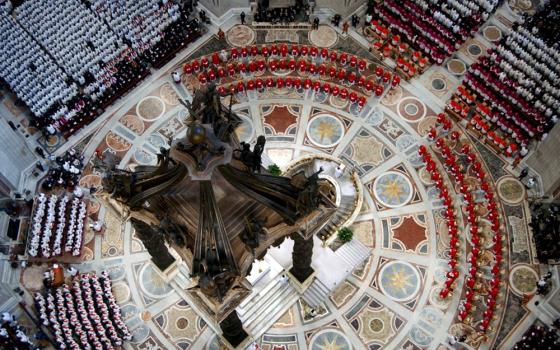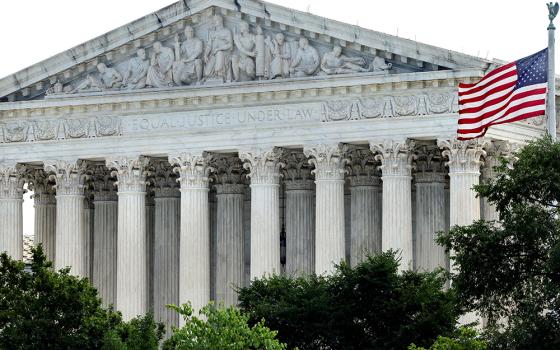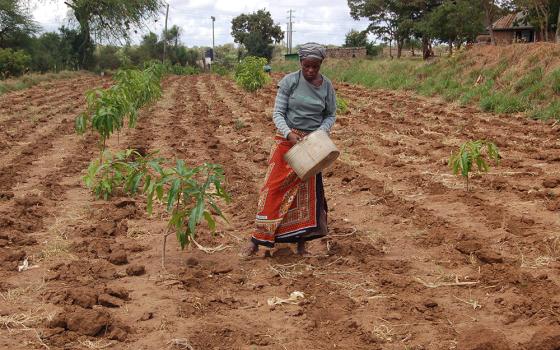CHARLOTTE, N.C. -- With a heavy turnout at the polls, North Carolina voters approved a constitutional amendment defining marriage as a union between one man and one woman by a 3-to-2 margin.
In unofficial results calculated late May 8 by the North Carolina State Board of Elections, 1,303,952 people -- 61.05 percent -- voted for the amendment while 831,788 people -- 38.95 percent -- voted against it.
The amendment read, "Marriage between one man and one woman is the only domestic legal union that shall be valid or recognized in this state." It enshrines the definition of traditional marriage in the state constitution, elevating it from what has been state law since 1996.
Bishop Peter J. Jugis of Charlotte and Bishop Michael F. Burbidge of Raleigh, who were at the Vatican May 8 for their "ad limina" visits, had both championed the amendment, which they said would prevent any arbitrary redefinition of marriage.
Marriage, they reminded Catholics, is based in natural law by God and instituted as a sacrament by Jesus Christ. It binds together a family, the fundamental building block of all societies, and provides the most stable and nurturing environment to raise children.
Bishop Jugis said May 8: "I am pleased that the people of North Carolina voted for marriage. The church consistently teaches that marriage is created by God as the faithful and exclusive union of one man and one woman, open to the gift of children."
In a separate statement, Bishop Burbidge urged Catholics to pray "that whatever divisions may have occurred during this referendum process, may be healed by the grace of God and a mutual renewed commitment by all people of good will, so that we may together build a society reflective of the unity that is ours as members of God's family."
Bishop Jugis had mentioned the marriage amendment battle during a meeting with Pope Benedict XVI earlier that day. In his homily at Mass at the altar of the tomb of Blessed John XXIII in St. Peter's Basilica May 8, Bishop Jugis said he and Bishop Burbidge had endured scorn for their efforts to uphold church teaching on marriage. It was a cross worth bearing, he said, "to be courageous in witnessing to the Gospel."
"I shared with another bishop my sadness over this criticism of our support for something as beautiful and foundational to society as traditional marriage," he said. The other bishop "encouraged me by saying, 'Wear it as a badge of honor.'"
Ever since the amendment was put on the ballot by the Republican-led Legislature last fall, the bishops had urged Catholics to vote for it. They communicated with parishioners in print and online diocesan news media, TV and radio ads, parish bulletins and postcards, billboards and yard signs, and letters read from the pulpit during Masses the weekend before the vote.
The bishops had said the vote presented an opportunity to explain the importance and sanctity of traditional marriage in the church and in society.
In a joint letter read at all Masses May 5-6, the bishops wrote, "We are for marriage, as we believe it is a vocation in which God calls couples to faithfully and permanently embrace a fruitful union in a mutual self-giving bond of love, according to his purposes. It is not only the union itself that is essential to these purposes, but also the life to which spouses are called to be open, the gift of children."
Their efforts ran parallel to the campaign by Vote For Marriage NC, a nonpartisan coalition of churches, groups and individuals that organized public support for the amendment, which even at the start of the campaign last fall was considered widely popular among North Carolina voters. Each diocese also donated $50,000 to the Vote for Marriage NC campaign for its advertising blitz and voter education efforts.
In a statement released on election night May 8, Tami Fitzgerald, chairwoman of Vote For Marriage NC, said, "We are thankful to God and to the people of North Carolina for joining together today to preserve marriage as the union between one man and one woman in our state constitution.
"North Carolinians have been waiting for nearly a decade to protect marriage -- a sacred institution authored by God -- from being redefined against the will of the people," she added. "The marriage protection amendment ensures that it will always be the people of our state who determine what marriage is in North Carolina, not an activist judge or future politicians."
North Carolina is the 31st state to define traditional marriage in its constitution, and the last among the Southern states to do so.
The amendment attracted large numbers of people to the polls, with 2.1 million (34 percent) of the state's 6.3 million registered voters casting a ballot on the question, according to the state elections board results. Turnout was as high as 50 percent in some counties.
Meanwhile in Colorado, legislation that would have permitted civil unions in the state died without a vote May 8.
The Colorado Catholic Conference had opposed the legislation, saying it "creates an alternative parallel structure to marriage" and "contradicts the will of the people of Colorado," who in 2006 approved a constitutional amendment that defined marriage as the union of a man and a woman.




